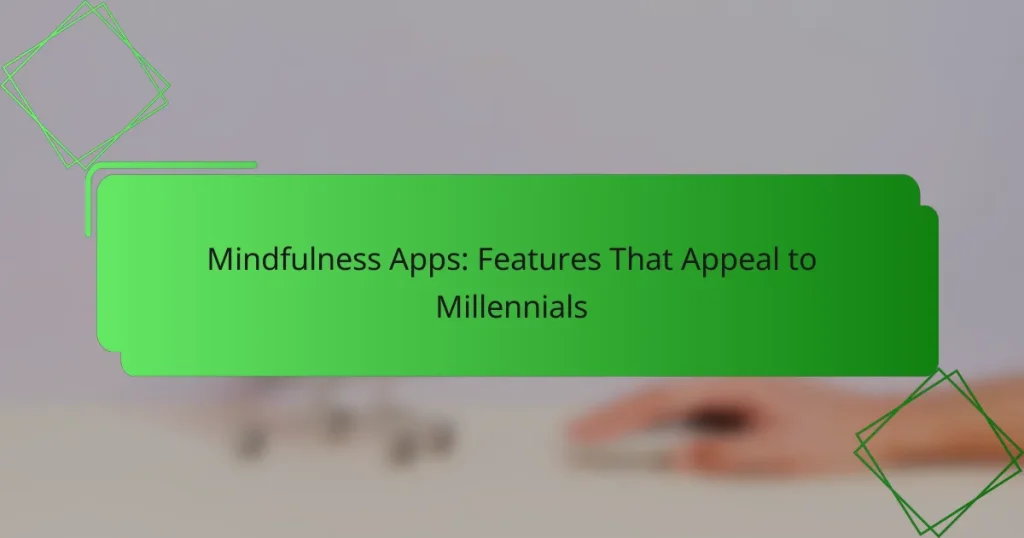Mindfulness apps have gained popularity among millennials by offering features that prioritize personalization, social interaction, and user engagement. These tools not only support mental well-being but also cater to the unique preferences of this generation, promoting healthier coping mechanisms and fostering a sense of community.
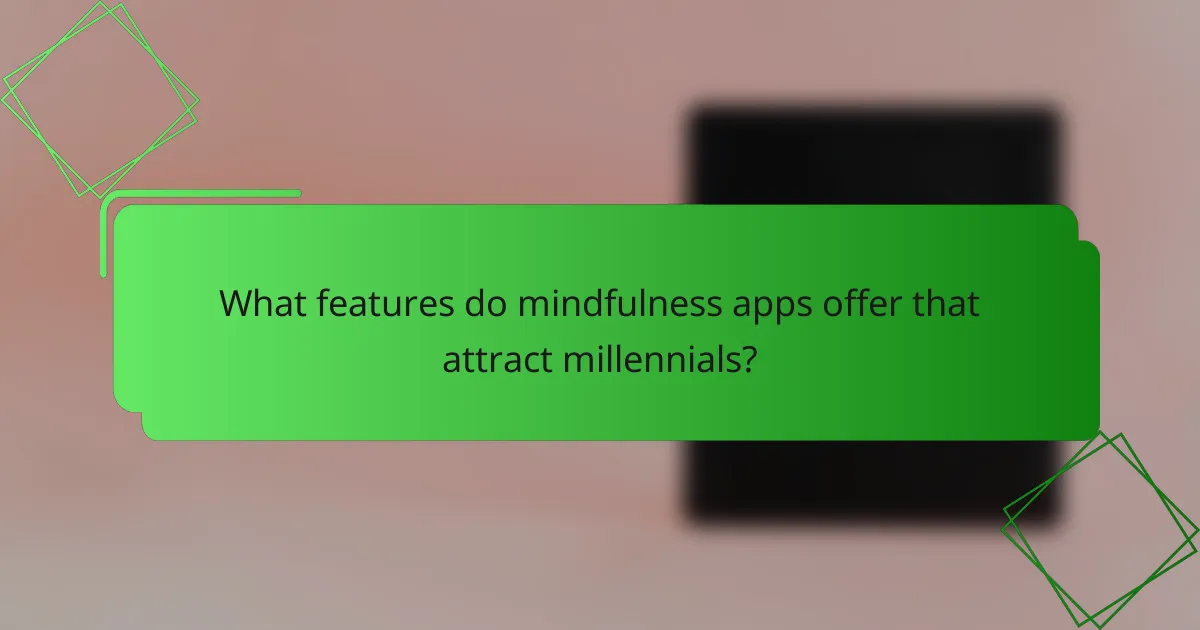
What features do mindfulness apps offer that attract millennials?
Mindfulness apps appeal to millennials through features that enhance personalization, social interaction, and engagement. These functionalities cater to their desire for tailored experiences and community support while promoting mental well-being.
Personalized meditation sessions
Personalized meditation sessions allow users to tailor their practice based on individual preferences, goals, and experience levels. Many apps offer customizable options, such as session length, focus areas like stress relief or sleep improvement, and guided versus unguided sessions.
This feature is particularly appealing to millennials who often seek solutions that fit their unique lifestyles. For instance, a busy professional might prefer short, focused sessions that can be completed in under ten minutes.
Social sharing capabilities
Social sharing capabilities enable users to connect with friends and share their mindfulness journeys, creating a sense of community. Many apps allow users to post achievements, favorite sessions, or even invite friends to join challenges.
This feature resonates with millennials who value social interaction and often seek validation and encouragement from their peers. Sharing progress on platforms like Instagram or Facebook can enhance motivation and accountability.
Gamification elements
Gamification elements incorporate game-like features, such as rewards, challenges, and progress tracking, to make mindfulness practice more engaging. Users can earn points or badges for completing sessions, which can motivate them to maintain a regular practice.
This approach appeals to millennials who appreciate interactive experiences. For example, an app might offer daily challenges that encourage users to meditate for a certain number of days in a row, fostering consistency through friendly competition.
Integration with wearable devices
Integration with wearable devices allows mindfulness apps to track physiological data, such as heart rate and sleep patterns, enhancing the user experience. This feature provides insights into how mindfulness practices impact overall well-being.
Community support forums
Community support forums provide a space for users to connect, share experiences, and seek advice from others on similar mindfulness journeys. These forums foster a sense of belonging and support, which is crucial for many millennials.
Participating in discussions can help users stay motivated and learn new techniques from peers. For example, a user might find tips on overcoming obstacles in their practice or discover new meditation styles that resonate with them.
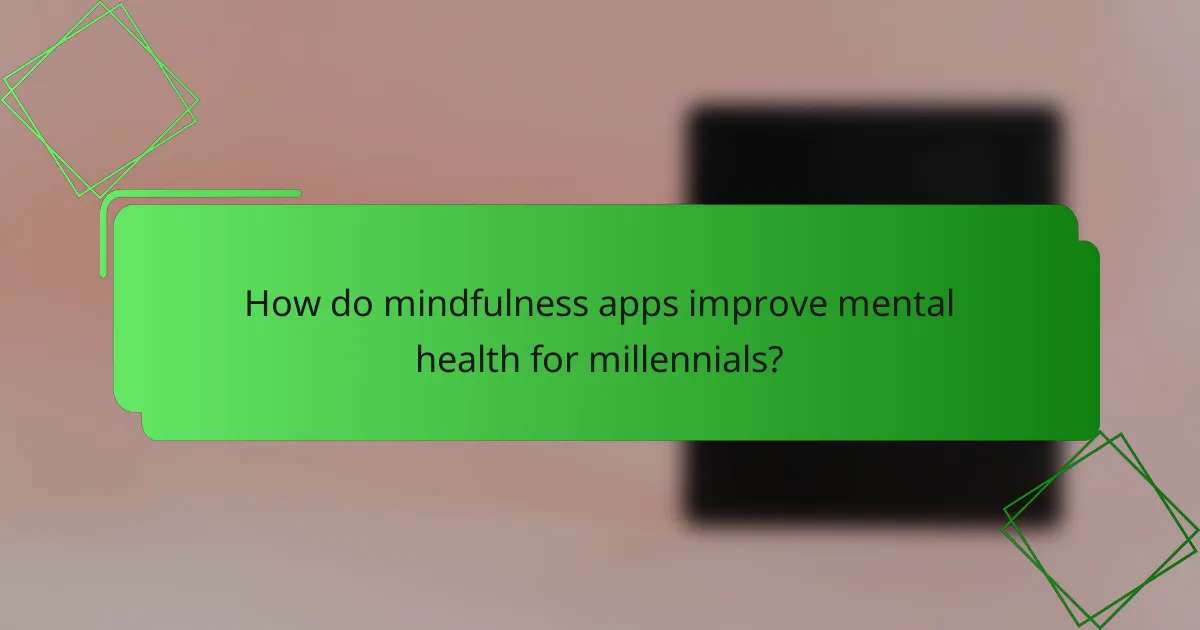
How do mindfulness apps improve mental health for millennials?
Mindfulness apps enhance mental health for millennials by providing accessible tools for stress management and emotional well-being. These applications offer a variety of features that cater to the unique needs of this generation, promoting healthier coping mechanisms and greater self-awareness.
Stress reduction techniques
Mindfulness apps often include stress reduction techniques such as breathing exercises, meditation, and progressive muscle relaxation. These methods help users lower their stress levels by encouraging a focus on the present moment and reducing anxiety triggers.
Many apps provide customizable sessions, allowing users to select the duration and type of technique that best fits their lifestyle. For example, short five-minute breathing exercises can be effective during a busy workday, while longer sessions may be more suitable for evenings.
Guided mindfulness practices
Guided mindfulness practices are a staple feature in many mindfulness apps, offering users structured sessions led by experienced instructors. These practices can range from simple meditations to more complex visualizations, helping users cultivate awareness and emotional resilience.
Some apps allow users to track their progress and set goals, making it easier to stay committed to their mindfulness journey. Popular options may include daily reminders and themed sessions focused on specific topics like gratitude or compassion.
Sleep improvement tools
Many mindfulness apps incorporate sleep improvement tools designed to help users establish healthier sleep patterns. These features may include sleep meditations, calming soundscapes, and bedtime stories aimed at promoting relaxation before sleep.
Users can benefit from tracking their sleep quality and duration, which can provide insights into their overall well-being. Some apps even offer personalized recommendations based on user feedback, helping to tailor the experience to individual needs.
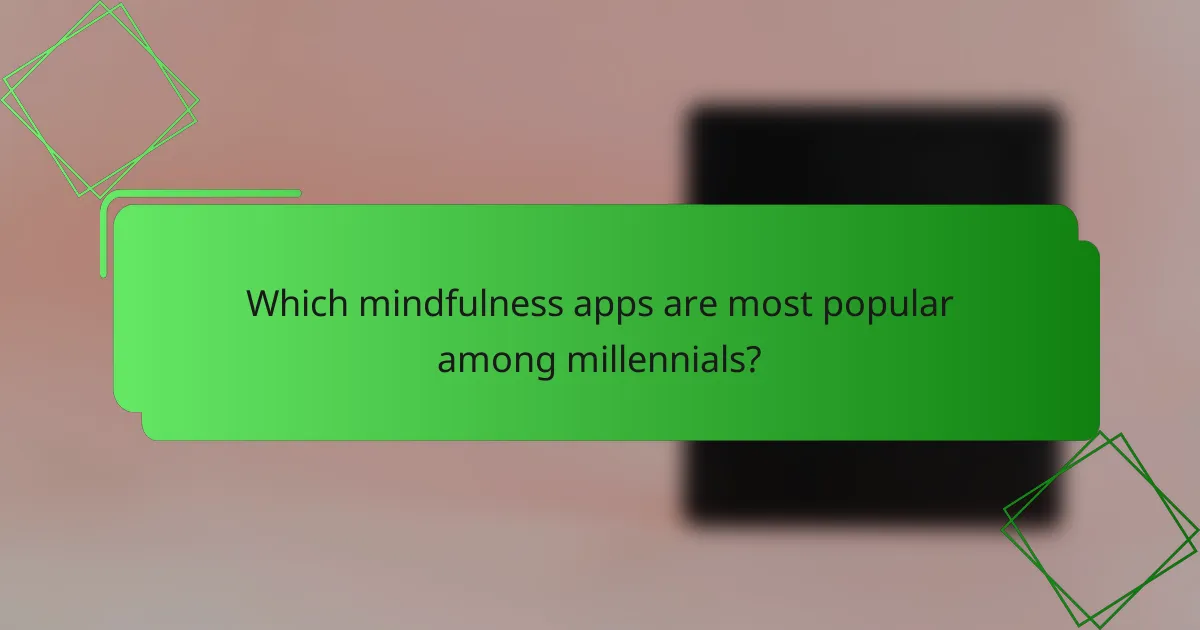
Which mindfulness apps are most popular among millennials?
Millennials often gravitate towards mindfulness apps that offer user-friendly features, engaging content, and community support. Popular choices include Headspace, Calm, and Insight Timer, each providing unique tools to enhance mental well-being.
Headspace
Headspace is known for its approachable design and structured courses that guide users through meditation practices. It offers a variety of sessions tailored to different needs, such as stress relief, focus, and sleep improvement.
The app features animations that explain mindfulness concepts, making it accessible for beginners. Users can choose from short sessions of just a few minutes to longer practices, allowing for flexibility in busy schedules.
Calm
Calm focuses on a holistic approach to mental wellness, combining meditation with sleep stories, music, and breathing exercises. Its diverse offerings cater to various preferences, making it appealing to a wide audience.
The app includes a library of soothing sounds and guided meditations that can last anywhere from three to 25 minutes. This variety helps users incorporate mindfulness into their daily routines, whether they have a few minutes or a longer period to dedicate to practice.
Insight Timer
Insight Timer stands out for its extensive library of free guided meditations and a vibrant community of users. With thousands of sessions available, it caters to different meditation styles and lengths, making it suitable for both beginners and experienced practitioners.
The app also features a timer function for self-guided meditation, allowing users to customize their practice. Community features, such as groups and discussions, foster connection and support among users, enhancing the overall mindfulness experience.
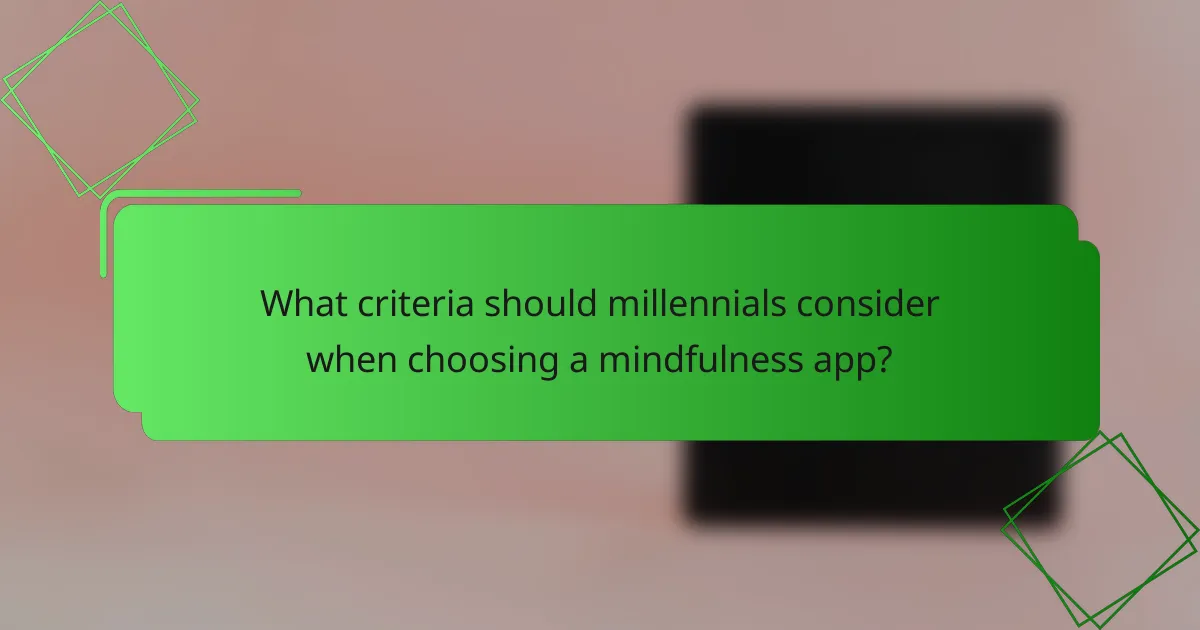
What criteria should millennials consider when choosing a mindfulness app?
Millennials should focus on user interface, cost, and content quality when selecting a mindfulness app. These factors significantly impact usability, affordability, and the effectiveness of the mindfulness experience.
User interface and experience
A user-friendly interface is crucial for a positive experience with mindfulness apps. Look for apps that are visually appealing, intuitive, and easy to navigate, as this can enhance engagement and consistency in practice.
Consider features like customizable settings, reminders, and progress tracking. An app that allows personalization can better cater to individual preferences and encourage regular use.
Cost and subscription models
Cost is a significant factor for many millennials when choosing a mindfulness app. Some apps offer free versions with limited features, while others may charge monthly or annual fees ranging from a few dollars to over ten dollars per month.
Evaluate the subscription models available. Some apps provide a one-time purchase option, while others may have tiered pricing based on features. Always check for free trials to assess if the app meets your needs before committing financially.
Content variety and quality
Content variety and quality are essential for maintaining interest and effectiveness in mindfulness practice. Look for apps that offer a range of guided meditations, breathing exercises, and mindfulness techniques suitable for different levels and preferences.
Additionally, consider the credentials of the instructors and the scientific backing of the content. Apps that collaborate with mental health professionals or have evidence-based practices can provide more reliable and beneficial experiences.
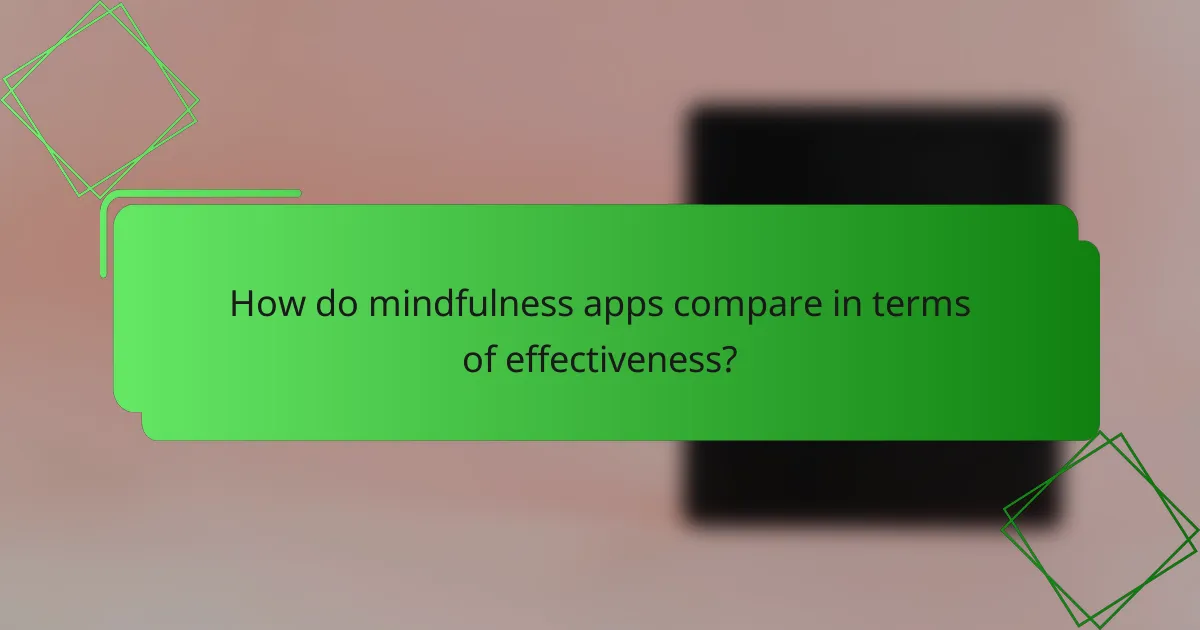
How do mindfulness apps compare in terms of effectiveness?
Mindfulness apps vary in effectiveness based on their methodologies, user feedback, and expert validation. While many users report positive outcomes, the actual impact can depend on individual preferences and the specific features of each app.
Research-backed methodologies
Many mindfulness apps utilize research-backed methodologies, such as cognitive behavioral therapy (CBT) and mindfulness-based stress reduction (MBSR). These techniques have been shown to help reduce anxiety and improve overall well-being. When selecting an app, look for those that reference scientific studies or have been developed in collaboration with mental health professionals.
Apps may incorporate guided meditations, breathing exercises, and progress tracking, all designed to enhance user engagement and effectiveness. For instance, an app that offers a variety of meditation lengths can cater to different schedules, making it easier for users to integrate mindfulness into their daily routines.
User testimonials and reviews
User testimonials can provide insight into the effectiveness of mindfulness apps. Many users share their experiences regarding how specific features helped them manage stress or improve focus. High ratings and positive reviews often indicate that an app resonates well with its audience.
However, it’s essential to consider the diversity of user experiences. What works for one person may not work for another, so look for apps with a broad range of testimonials that highlight various features and outcomes. This can help you identify which app might suit your personal needs best.
Expert endorsements
Expert endorsements can significantly enhance the credibility of mindfulness apps. Many reputable mental health professionals recommend apps that are grounded in established psychological principles. Endorsements from psychologists or wellness coaches can guide users toward effective options.
When evaluating an app, check if it has been featured in mental health publications or recommended by professionals in the field. This can provide additional assurance that the app’s methodologies are sound and potentially beneficial for users seeking mindfulness support.
